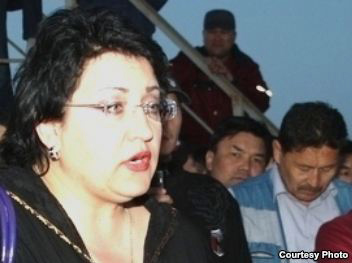– Mrs. Sokolova has only done her job as a legal representative, protecting the rights of oil workers that are demanding to run their trade union without interference from the director of the company, and to have better working conditions and higher salaries in accordance with set standards. The authorities must respect rights inscribed in the Constitution as well as protected by international human rights conventions, Engesland continues.

On 8 August, Natalya Sokolova, a legal representative of the trade union «Karazhanbasmunai», was sentenced to six years of imprisonment in a colony of common security. The court found Sokolova guilty of violating two articles of the Criminal Code of Kazakhstan, by inciting social, national, tribal, and racial irreligious enmity (article 164) and violating the regulations of organizing and holding meetings, rallies, pickets, marches and demonstrations (article 334). She had been held in detention since 24 May.
Reportedly, her trial was held behind closed doors without mass media, oil workers or human rights activists being able to follow the proceedings, and her husband has not been allowed to visit her in prison since.
– The Norwegian Helsinki Committee is concerned with Sokolova’s conviction, commented Engesland. Kazakhstan should respect freedom of assembly, freedom of association and freedom of speech of any person. Using the criminal justice system to silence a lawyer’s legitimate and peaceful fight for the rights of the oil workers is not acceptable. We call for the court to use the opportunity of the appeal hearing to reject the sentence and immediately release Sokolova. Kazakhstan chaired the OSCE in 2010, preceded by pledges to uphold human rights. Unfortunately, this case illustrates lack of respect for basic human rights as well as attacking the legitimate role of human rights defenders and labour unionists.
Since 17 May 2011, oil workers of the trade unions “Karazhanbasmunai” and “Ozenmunaygaz” have been striking, demanding improved working conditions and better salaries. As their lawyer, Sokolova attended meetings and gatherings with the oil workers, providing legal advise on the process.
Since the beginning of the strikes 993 workers have been fired from the oil companies, and other workers have been hired in their place. Workers from other oil companies in the region are reluctant to join them as they allegedly have signed contracts where they promise not to go on strike. Others are put back by the pressure put on the striking oil workers through police surveillance and intimidation.
The NHC was concerned to experience what was conceived as threatening presence of security services around strikers during a recent visit to the square in Zhanaozen, where the strikers are gathered in their fourth month.

